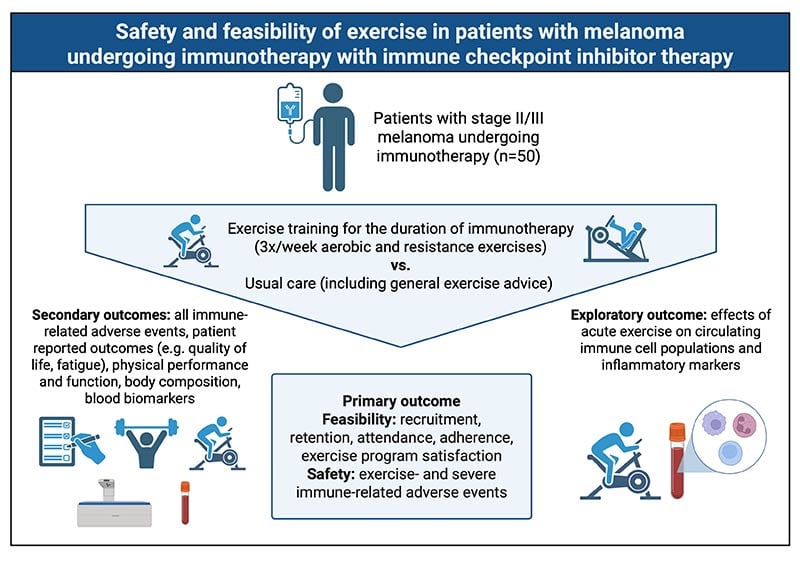Grant title: Safety and feasibility of exercise in patients with melanoma undergoing adjuvant immunotherapy with immune checkpoint inhibitor therapy
Institution: Australian Catholic University
Grant awarded: September 2025
Immunotherapy has significantly advanced how we treat cancer. However, immune-related adverse events are common and can be severe. Exercise has been proven to be safe and beneficial in managing side-effects from other cancer treatments. However, it is crucial to study the physiological response and confirm the safety of combining exercise and immunotherapy, given exercise itself impacts the immune system. We are extremely grateful for the funding provided by World Cancer Research Fund, as part of the World Cancer Research Fund International grant programme, to advance our knowledge in this understudied field of research – Dr Eva Zopf
Background
Immunotherapy is a relatively new treatment approach that is increasingly being prescribed to people diagnosed with cancer, including melanoma, a type of skin cancer. Immunotherapy works by enhancing the ability of the own immune system to kill cancer cells. While this treatment can be very effective, over 90% of people experience adverse treatment reactions, commonly referred to as immune-related adverse events, which can impact wellbeing and quality of life, and affect how much treatment the person can tolerate or receive.
Exercise has been established as a safe and beneficial intervention during other cancer treatments, however, the safety and effects of exercise in individuals receiving immunotherapy has not been established. Given exercise itself impacts the immune system and thereby could change side-effect and treatment response profiles, it is crucial to first assess the feasibility and safety of combining exercise and immunotherapy.
Aims and objectives
The main aim of this study is to investigate the safety and feasibility of exercising during adjuvant immunotherapy – immunotherapy following surgery – in people diagnosed with melanoma. We will also explore the preliminary effects of exercise training on health and wellbeing, treatment-related side-effects and blood biomarkers, and the effect of a single exercise session on the immune system at the start and after 12 weeks of immunotherapy. We expect that participating in an exercise programme while undergoing adjuvant immunotherapy for melanoma will be feasible and safe.
How it will be done
This study will be conducted in Australia. Australia has the highest rates of melanoma in the world, with a new case of melanoma diagnosed every 30 minutes and 1 Australian dying of the disease every 6 hours. Fifty people diagnosed with melanoma will be involved in the study and either receive an exercise programme for the duration of their immunotherapy or maintain their usual routine. Participants will attend the study centre 3 times for assessments and complete questionnaires at home following their immunotherapy treatment.
Primarily we will assess if participants attend the exercise sessions, can adhere to the exercise prescription and how they experience the exercise programme. We will also confirm that there are no safety concerns exercising during immunotherapy treatment. The research team has extensive experience successfully developing, leading and conducting exercise oncology trials.

Created by Dr Eva Zopf, Australian Catholic University
Potential impact
This study will provide important new insights into the feasibility and safety of exercise during immunotherapy; a treatment being prescribed to an increasing number of individuals with cancer. The findings will inform future studies that will help establish exercise recommendations for people undergoing this type of treatment.
